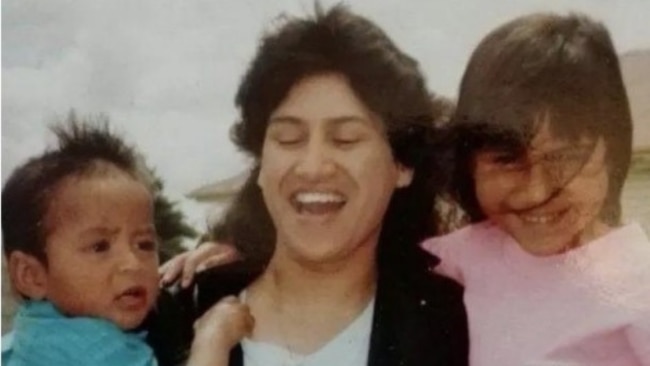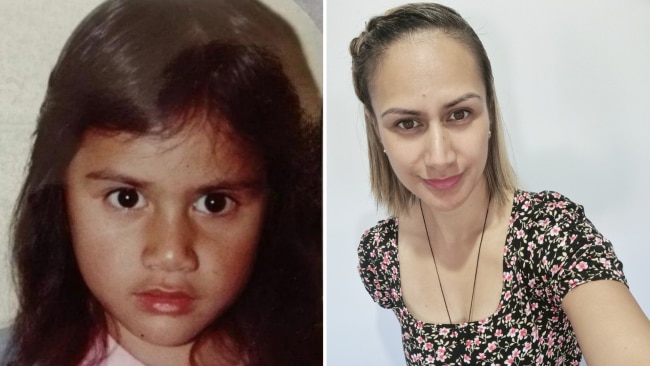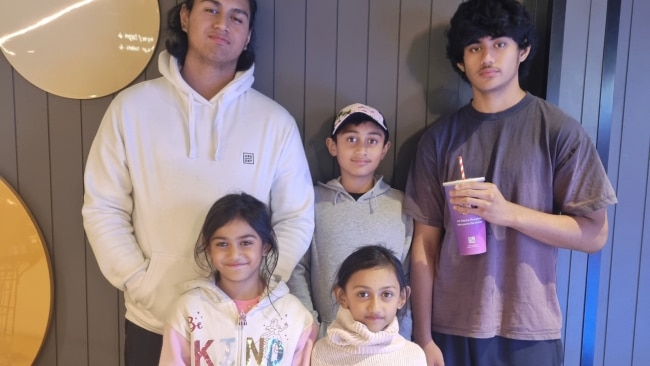'I grew up witnessing domestic violence before I knew it was a crime'
“I thought it was normal, I had nothing to compare it to," Queensland woman Destani Davies shares exclusively with Kidspot. Please note: this article contains sensitive topics.
Parenting
Don't miss out on the headlines from Parenting. Followed categories will be added to My News.
Destani Davies grew up at a time when there was no vocabulary to describe what was going on in her family home.
“I saw my mother being thrown like a rag doll and beaten to a pulp by my dad,” she says. “He drank a lot.”
The 36-year-old from Brisbane attended more than 40 primary schools and lived in women’s refuges and foster homes. “I thought it was normal,” she says. “I had nothing to compare it to.”
Want to join the family? Sign up to our Kidspot newsletter for more stories like this.

RELATED: Why the Nacho Parenting style works for our family
“I didn’t think we’d make it out alive”
“You become good at studying people at a young age,” Destani adds. “I learnt to adapt my behaviour according to his mood. I’d know by the tone of [dad's] voice something was coming. You kept out of his way as much as you could. I’d tread on eggshells a lot.”
This was a time when police mostly treated such incidents as ‘just a domestic,’ and before there was an understanding that such behaviour was a criminal offence and the dangerous perpetrators should be imprisoned.
The eldest of three siblings in the house, as Destani grew older, she started feeling a responsibility to protect her younger siblings - and even her mum.
“Mum was very small in stature,” she says. “He was much taller. Sometimes he’d use items; I remember one time, in particular, he used a baton. Another time, he smashed a glass so hard, shards of it went into my baby brother’s pram, I remember thinking, oh my gosh, please don’t let the glass hurt him. I couldn’t do anything - I was too little.”
For a young person’s shoulders, it was a lot to bear. “A couple of instances I didn't think we’d make it out alive,” she says.
She also remembers shielding her younger siblings. “I remember protecting them from even seeing what was happening, even though I was scared myself. I’d hide them behind a curtain or something.”
Playing this role as the inadvertent protector paid off: her younger siblings today don’t remember as much of the abuse and violence as she does.
“Sometimes I’ll say ‘do you remember this?’ and they’ll say no, so I’ll stop. I won’t go into how violent it actually was with them in that moment; I’m glad they don’t remember. At least I’m the only one who’s carrying the pain of the memories.”

RELATED: Single mum rejected from rentals because she’s… a mum
Hanging on to glimpses of light in the dark
Destani was conflicted about her complex feelings towards her violent father.
“There was this nice side to him which was very loving,” she says. “But only when he wasn’t drinking. Which was most of the time. He was obviously going through his own things. As a kid, you’d cherish and hang on to those glimpses of light in the dark.”
Eventually, her mum started taking her and her siblings to women’s refuges. Destani loved them.
“It was like Christmas. I was able to experience another side of life: where cupboards were full of food and people were kind.”
Ultimately, though, Destani grew up believing her household was ‘normal.’
“We grew up in a lower socioeconomic area where this kind of violence was prevalent,” she says.
Her dad eventually left her mum for someone else.
“After everything mum had endured, that was very painful for her,” she says.
“But I also saw it as a blessing. I honestly don’t think she’d be here if they’d have stayed together. That relationship wasn’t healthy at all.”
"Part of me felt this was what I deserved"
As a teenager, at 18 - around the same age her mum gave birth to her - Destani found herself in an abusive relationship.
“He was very violent towards me,” she says. “Although I knew in my heart it wasn't right, part of me felt this was what I deserved; I’d grown up around it. It’d also been a generational norm in my family, going back before my parents to their parents.”
Quickly, though, Destani realised this wasn’t the future she wanted. "I vowed in that moment if I saw any of these behaviours I’d close the door before it even opened."

“I’ve forgiven him”
Today, Destani carries the scars of the trauma. She has a very good relationship with her mum, but a more complex one with her dad.
“I love my father, but our relationship could be much better,” she says. He has apologised, and I’ve forgiven him; I recognise there were probably experiences that led him to make those choices. But I’m not sure he has forgiven himself.”
It has also impacted her parenting. “The minute I raise my voice to my kids, I catch myself, bring it down and apologise,” she says. “I don’t want them getting used to aggression.”
Attending so many primary schools, foster homes and women’s refuges had a lasting impact, one that Destani has transformed into a positive. “I used to think I did something wrong and that's why I wasn't with my mum,” she says. “But in my career, it was helpful for me to be so adaptable to change.”
Eventually, though, trauma catches up.
“I always believe it'll fester up in some other way if you haven't healed yourself when you get older,” she says.
This happened in 2021 when she “fell into darkness” and attempted to take her own life.
“I knew I couldn’t - I have five beautiful kids to live for,” she says. “I rang EAP (Employees’ Assistance Program) via my work and connected with a psychologist who helped me work through it all. It was very scary. But counselling, meditation and journaling has really helped.”
"Hard to overstate" the impact
Research commissioned by ANROWS (Australia’s National Research Organisation for Women’s Safety Limited) in July last year found that children who had experienced domestic and family violence were almost five times more likely to receive treatment from a mental health service by the time they turned 18 than children who had not experienced violence (79% as opposed to 16%).
Psychologist Carly Dober has worked extensively with clients who’ve experienced domestic violence and says it’s hard to overstate how much witnessing it impacts all facets of a person’s life: “It can lead to insomnia, low self-esteem, anxiety, depression and PTSD,” she says.
If people grow up seeing such violence, it can encourage them to keep secrets.
“It can impact how close they feel to their friends and infect their idea of a healthy romantic relationship. It can also lead to risky sexual behaviour and drug and alcohol abuse.”
Shedding a light for others
This is the first time Destani has spoken out publicly; she didn’t share any of this with anyone until she was an adult.
“Hopefully I can shed light for others so they can find their way now if they're experiencing this. I think that's a beautiful gift.”
If you or someone you know is impacted by family violence, call 1800RESPECT on 1800 737 732 or visit www.1800RESPECT.org.au. In an emergency, call 000.
Gary Nunn is a Walkleys Our Watch Journalist Fellowship graduate.
More Coverage
Originally published as 'I grew up witnessing domestic violence before I knew it was a crime'




